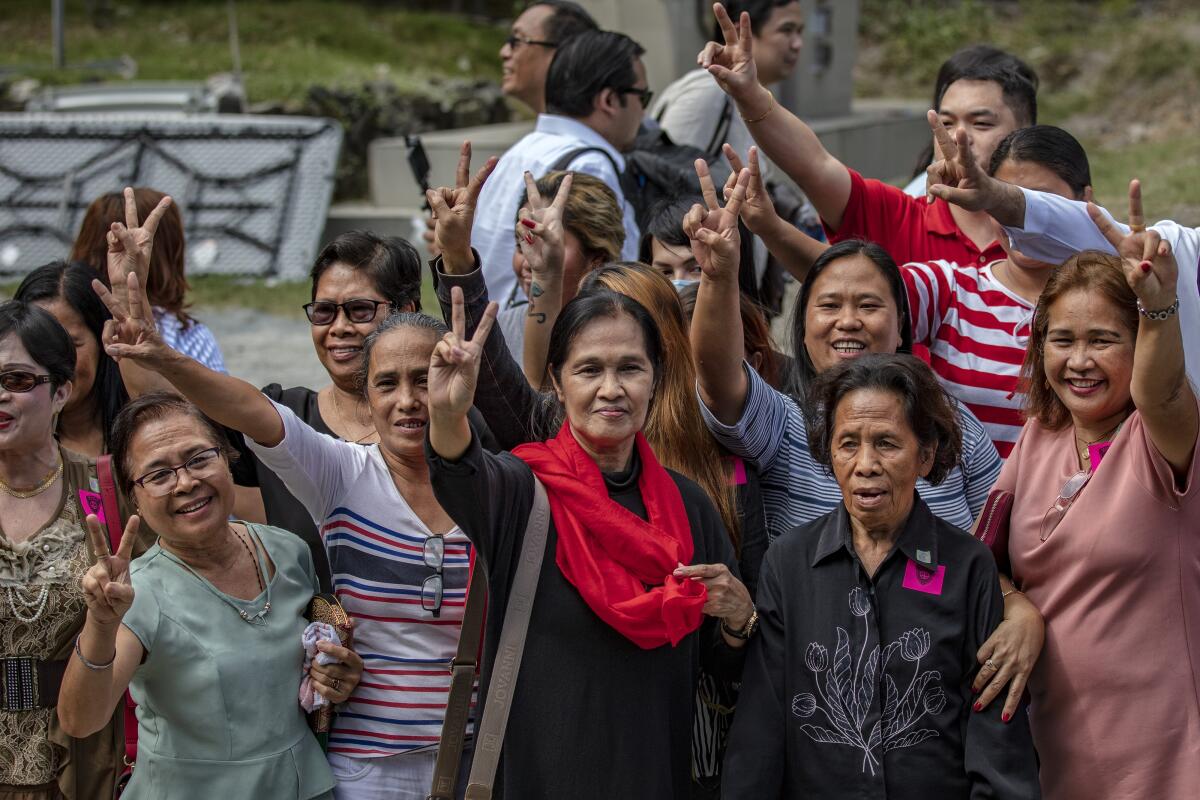Philippine court convicts key clan members in 2009 massacre

- Share via
MANILA — A Philippine court Thursday found key members of a powerful political clan guilty of a 2009 massacre in a southern province that left 57 people, including 32 media workers, dead in a brazen execution-style attack that horrified the world.
Judge Jocelyn Solis-Reyes acquitted several members of the Ampatuan family and police officers, citing a lack of evidence. Families of the victims and media watchdogs welcomed the convictions but said the fight for justice was far from over.
“This is a partial victory,” Rep. Esmael Mangudadatu, who lost his wife, sisters, an aunt and many followers in the gruesome Nov. 23, 2009, killings, told reporters outside the packed and heavily secured courtroom.
Mangudadatu raised his right fist to show he would fight on with the expected appeals of those convicted.
“This momentous verdict should help provide justice to the families of the victims, and build toward greater accountability for rights abuses in the country,” said Phil Robertson, deputy Asia director of Human Rights Watch.
“Even with these convictions, the families’ search for justice remains far from over. Some 80 other people accused have yet to be arrested,” he said.
Solis-Reyes sentenced five key members of the Ampatuan family — led by former town mayor Andal Ampatuan Jr., who oversaw and led the killings — to life imprisonment. The 40-year prison term is the maximum punishment allowed by law. They were also ordered to compensate the victims’ families.
Applause and cheers rang out in the courtroom, where some relatives of the victims heard the reading of the verdict from a 761-page decision.
The case involved more than 100 detained suspects, and it is seen as a test of the Southeast Asian nation’s notoriously clogged and vulnerable judicial system.
Although the mass killing largely unraveled as an offshoot of a violent electoral rivalry common in many rural areas, it has also showcased the threats faced by journalists in the Philippines. Thirty-two of those gunned down were local reporters and media workers, the worst single attack on journalists in the world.
“If I have the power to kill them all in a blink of an eye, I would have done it. But I realized in the end that I’m not a demon like them,” said Mary Grace Morales. Her husband, a reporter for a local provincial newspaper, and her elder sister, the paper’s publisher, were among those killed, mostly in a blaze of automatic rifle fire as they begged for their lives.
Ampatuan Jr. was convicted of leading nearly 200 armed followers who blocked a seven-vehicle convoy carrying the wife, sisters and other relatives and lawyers of Mangudadatu, a politician who decided to run for governor of Maguindanao province. He challenged the powerful Ampatuan clan, who held sway over almost every aspect of life in an impoverished region long racked by an Islamic insurgency.
The journalists joined the convoy to cover the filing of candidacy for Mangudadatu in an election office in Maguindanao’s capital. Mangudadatu, now a legislator in the House of Representatives, was not in the convoy for security reasons.
The gunmen commandeered the convoy, including the passengers of two cars that got stuck in the traffic, to a nearby hilltop, where a waiting backhoe had dug huge pits to be used in burying the victims and their vehicles.
Ampatuan Jr. and his followers opened fire on the victims at close range and hurriedly escaped after sensing that army troops were approaching. The badly mutilated bodies were found inside the vans, sprawled on the ground or buried in the pits with some of the vehicles, in a gruesome scene that drew international outrage and shocked many, even in a country long used to political violence.
The Ampatuans have denied the charges against them.
At least three witnesses who testified against them have been killed over the years, according to Nena Santos, a lawyer for Mangudadatu and families of several other victims. She said she had been threatened with death multiple times and was offered a huge amount of money to withdraw from the case.
Gloria Teodoro, whose journalist husband was among the victims, said the government should work to eradicate the lethal mix of problems that allowed the massacre to happen, including the large number of high-powered firearms in the hands of many politicians and clans and a long-entrenched culture of impunity.
Otherwise, she said, such political violence, even on a less gruesome scale, would go on.
More to Read
Sign up for Essential California
The most important California stories and recommendations in your inbox every morning.
You may occasionally receive promotional content from the Los Angeles Times.










